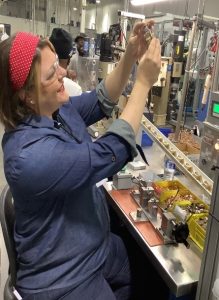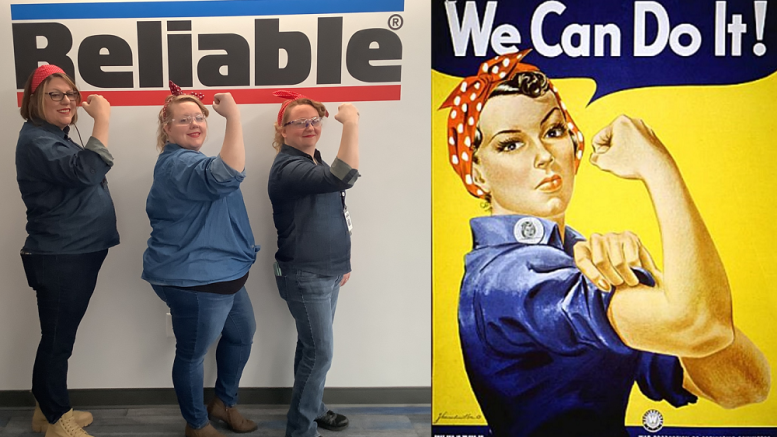Reliable Automatic Sprinkler Corporation (RASCO), the leading global supplier of fire safety products, recently hosted a plant visit for the OpExChange in Liberty, South Carolina to showcase their implementation of Training within Industry (TWI), a training technique that has been successful for multiple decades. RASCO has been an active member of OpExChange for the past fifteen years.
The Pickens County Commerce Park facility, which serves as RASCO’s sole manufacturing site, boasts cutting-edge manufacturing technologies including robotic automation, vision systems, and automated X-ray inspection. Over the years, the company has effectively integrated increasing levels of automation with the existing manual assembly operations. As volumes and product diversity have increased, they added staff in the last six years. With this growth came the importance of recognizing the human element and training retention.
RASCO’s Director of Industrial Engineering, Continuous Improvement and Manufacturing Training, Amy Williams, was inspired to implement TWI after attending a workshop at the South Carolina Manufacturing Extension Partnership (SCMEP) several years ago. She was impressed with the program’s simplicity and effectiveness and developed a vision for a plant-wide implementation. She sold the leadership team on the plan and began taking actions to make it a reality.
The implementation of TWI has brought significant benefits to RASCO, allowing the company to streamline their training process and boost efficiency. With the program’s success, RASCO has also been able to enhance employee engagement and satisfaction.
RASCO’s dedication to fostering innovation and providing training opportunities for its employees further solidifies its position as the leading global provider of fire safety products.
Training with Industry – Tried-and-True
TWI, a tried-and-true training method, was developed in the United States during World War II when skilled manufacturing employees left their positions to serve their country, and non-traditional employees filled these spots. TWI quickly became a rapid and standardized method of training the new workforce, boosting industrial production and outproducing the enemy. It also formed the foundation for standardized work and was used to rebuild Japan’s infrastructure post-war.
TWI incorporates a “learn-by-doing” approach and provides job breakdown scripts that relay Important Steps (the What), the Keys Points (the How), and the Reasons (the Why) for those key points. RASCO uses the “7X” method of job instruction training, where the trainer tells and shows the learner the job three times, the trainee performs the task silently, and then the learner tells and shows the job three times. Trainers and learners perform the job three times by explaining the important steps, key points, and reasons for the key points. The objective of TWI is to consistently develop a well-trained workforce, ultimately reducing scrap and rework, improving safety, quality, and customer satisfaction, while increasing employee engagement and reducing turnover. These factors make it an ideal training method for all manufacturing companies.
RASCO Implementation and Testimonials
From the initial idea to launch the TWI Program to present day, it has been a six-year journey for Reliable. The initial three years were spent on creating a plan and putting it into action. Amy and senior industrial engineer, Sonya Cauthen, became certified TWI trainers, and the entire leadership team underwent training.
They also developed over 500 job scripts and training curriculum during this time. The next three years were focused on the actual training process, with ten to fifteen employees per class for eight courses. During this phase, Amy promoted three employees to the Training Specialist position. Each of them guided the OpExChange visitors through TWI implementations during various points of the plant tour.
Kimberly Vega, one of the three training specialists at the plant, shared her testimonial with the group. Having joined RASCO as a production operator six years ago without prior manufacturing experience, she acquired knowledge of the factory processes through on-the-job training and became an expert in the subject matter.
She praised the TWI training and methodology for its applicability and standardization. According to her, she can now easily extract the important steps, key points, and reasons by interviewing a subject matter expert and use them to create the training script. Kimberly stated, “TWI has provided me with a structured approach to deliver job training to trainees. I am confident that they are receiving all the necessary information consistently, enabling them to perform the job correctly, safely, and conscientiously.”
Tim Steen, production manager, is a beneficiary of the TWI training as an internal customer. He acknowledges the advantages of standardized training, particularly during their launch of a third shift operation. “TWI has been critical to me,” he stated. “I noticed the trainers’ consistency when they utilized the 7X approach. TWI has become the foundation of our ability to be a world-class leader in sprinklers and valve manufacturing.”
Inflection Points for the OpExChange
RASCO’s implementation of TWI has been a learning experience, requiring dedication, effort, and backing. Nathan Deshong, the Vice President of Manufacturing, acknowledged that the journey had its ups and downs. He emphasized that it is crucial to be selective while choosing trainers as not everyone is cut out for the role.
 Amy shared a set of six lessons learned from their implementation, or inflection points, with the OpExChange visitors:
Amy shared a set of six lessons learned from their implementation, or inflection points, with the OpExChange visitors:
- Develop in-house trainers. Do not rely on consultants or trainers to do the training of the workforce and hold job instruction and relations training quarterly. Involve leadership in the training.
- Select trainers carefully. Choose individuals who are resilient and emotionally robust with excellent people skills and process knowledge.
- Require trainer certification. Include additional practice time, job script presentation to management, and a mock demonstration.
- Teach supervision courses. It is important to involve the production supervisors so that they not only understand the program but also experience the actual training.
- Hire Training Specialists – Adequate staffing of individuals who can mentor new trainers, perform audits, and create new training content is critical to sustaining and continuing to improve the program.
- Hold Reflection Meetings – Ten-to-fifteen-minute session with production supervisor and trainers. Focus on what should be started, stopped, and continued.
Technology not Required (But it helps)
Despite being in existence for over 80 years, the fundamentals of the TWI program remain unchanged. A company can initiate the program without an electronic or industry 4.0 foundation. However, the use of such an infrastructure can significantly enhance and accelerate the program. RASCO has successfully implemented various “Gamechanger” tools that have improved visibility and provided better tools for the production team, trainers, and management.
- Cross-Training Matrix – Many manufacturing sites have a training or skills matrix, frequently in Excel, that displays employees trained in various jobs or skills. RASCO has utilized Microsoft Power BI to provide an up-to-date cross-training matrix, easily accessible by supervisors.
- Training Curriculum – All job scripts are organized into chapters, much like a textbook. This includes cycle time and time to train.
- Training Tracker – The trainer updates training activity on a tablet, including training time, skill set, and any comments. This is captured and reported real-time through Microsoft Power BI.
- Training Dashboard – A high level metrics dashboard displays the KPIs associated with the program. To date, (50) trainers have been trained and 492 learners have been trained on 277 skill sets. A cumulate of 1,400 hours of direct training time has been conducted with 23,000 hours of practice time.
- Learning Management System – A SharePoint site provides a user-friendly interface for the organization to access all TWI information.
RASCO’s Pursuit of Operational Excellence: What’s Next?
Amy Williams noted that RASCO’s implementation of TWI has been a true journey of pursuing operational excellence. The program came a long way since its inception and has now trained over 100 people. Despite this progress, Amy emphasized that there is still room for further development. She explained that the weekly reflection meetings have been a crucial aspect of this journey, as they provide an opportunity to review the effectiveness of the training and identify opportunities for improvement. By constantly evaluating and refining their approach, RASCO continues to strengthen their TWI program to drive greater efficiency, productivity, and engagement across their operations.
Amy expressed that this was a team effort at the plant which started from a seed planted six years ago. She stated, “I am thankful to the SCMEP for that education and exposure, or we wouldn’t be here at all. I am also thankful to the Reliable management team that believed in and supported the vision.”
In the wrap-up discussion, Amy revealed that the next step-level improvement in RASCO operations will likely include Toyota KATA methodology. Her team attended an OpExChange workshop from the SCMEP last year that exposed her and her team to this valuable tool.
About Reliable Automatic Sprinkler
Reliable Automatic Sprinkler Co., Inc. is a global manufacturer and distributor of fire protection products. Reliable manufactures the highest quality and most innovative fire sprinklers, valves, and special systems on the market; distributes a full line of best-in-class system components; and backs it up with premier customer service. Reliable’s corporate headquarters is located in Elmsford, New York; manufacturing plant in Liberty, South Carolina, and regional sales and distribution centers throughout the US and worldwide.
https://www.reliablesprinkler.com/
About OpExChange
The OpExChange, sponsored by the South Carolina Manufacturing Extension Partnership, is a peer-to-peer network of manufacturers and distributors in South Carolina known for generating success for members through benchmarking and best practice sharing. Member companies host events and share practical examples of industrial automation, lean manufacturing improvements, and leadership development. It is an invaluable resource to South Carolina companies that provides access to others who are on similar improvement journeys. If your company is interested in participating in this collaborative effort to improve both the competitiveness of your operation and South Carolina, contact Mike Demos (Mike@OpExChange.com). More information and upcoming plant visits are available on the OpExChange website www.OpExChange.com.


Be the first to comment on "Reliable Automatic Sprinkler’s Full Plant Rollout of Training within Industry"